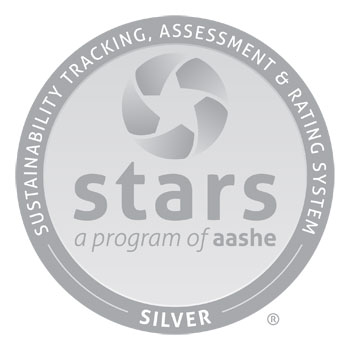Rice has received the highest score in Texas for its sustainability initiatives by the Sustainability Tracking, Assessment and Ratings System (STARS), administered by the Association for the Advancement of Sustainability in Higher Education.
 In December, Rice earned a STARS rating of Silver with a 58.49 point overall score — the highest of any other STARS institution in Texas. Other STARS Silver-rated institutions in Texas are Texas A&M, the University of North Texas, the University of Texas at Austin and the University of Texas at Arlington.
In December, Rice earned a STARS rating of Silver with a 58.49 point overall score — the highest of any other STARS institution in Texas. Other STARS Silver-rated institutions in Texas are Texas A&M, the University of North Texas, the University of Texas at Austin and the University of Texas at Arlington.
Through STARS, institutions evaluate performance in four main categories: academics, engagement, operations, and planning and administration; the institutions can earn a range of ratings based on point totals: bronze, silver, gold and platinum.
Rice earned points in the academics category for, among other things, offering courses that use the campus as a laboratory for learning about sustainability. For example, Rice courses have engaged students in developing strategies for reducing the university’s carbon footprint and energy usage, studying the potential for renewable energies on campus and identifying and implementing steps to reduce solid waste in the dining process (such as trayless dining). Rice also earned points for offering faculty incentives for developing sustainability courses.
Rice scored high for notable accomplishments during the past three years by faculty and staff engaged in sustainability research: Among other accomplishments, in November 2012 Rice scientists unveiled a revolutionary new technology that uses nanoparticles to convert solar energy directly into steam, and in June 2014 Rice scientists created an Earth-friendly way to separate carbon dioxide from natural gas at wellheads.
In the engagement category, Rice earned points for such things as the Green Dorm Initiative, a three-week program that encourages Rice undergraduates (through incentives and prizes) to adopt sustainable lifestyles in their dorm rooms; Recyclemania, an annual intercollegiate recycling competition in which Rice participates; and the popular FREE-cycling events in which Rice faculty and staff are encouraged to donate or swap unneeded or unused office supplies. Rice also was lauded for its student groups focused on sustainability, such as the Rice Environmental Club, the green and healthy dining-focused Real Food Revolution and the EcoRep Program, in which one student from each of Rice’s residential colleges undertakes projects to encourage sustainable living in their respective colleges.
Also earning points for Rice were four innovative programs, projects and policies: the Rice University Farmers Market; the Center for Energy and Environmental Research in the Human Sciences, the first research center in the world specifically designed to sponsor research on the energy/environment nexus across the arts, humanities and social sciences; the Rice Alliance for Technology and Entrepreneurship, which promotes clean technology and sustainability through the Rice Alliance Energy and Clean Technology Venture Forum and Nanotechnology Forum and through the Rice Business Plan Competition; and Rice’s participation in the Electricity Reliability Council of Texas’ (ERCOT) Demand Response Program, in which end-use customers reduce their use of electricity in response to power-grid needs or economic signals from a competitive wholesale market to help ensure ERCOT grid reliability while reducing greenhouse gas emissions.
Johnson worked with undergraduates Julianne Crawford and Alex Nunez-Thompson to compile and submit a report of Rice’s campus sustainability initiatives across many different topical areas. “There’s no way I could have done this without them,” Johnson said.
Crawford and Nunez-Thompson served as Johnson’s interns from May to August, and they took the lead in contacting appropriate campus personnel, gathering the data and preparing the STARS submission.
“Together they made a great team,” Johnson said. “Beyond the actual mechanics of the STARS submittal itself, they also helped to identify best practices at other universities and provided me with several ideas about how to improve our campus sustainability efforts at Rice. Both were hard-working, detail-oriented and delightful to work with.”
Developed by the Association for the Advancement of Sustainability in Higher Education, an organization of colleges and universities committed to a sustainable future, STARS is a transparent, self-reporting framework for colleges and universities to measure their sustainability performance. It is the only program of its kind that involves publicly reporting comprehensive information related to a college or university’s sustainability performance. For more information on the STARS program, visit stars.aashe.org. See Rice’s STARS report at https://stars.aashe.org/institutions/rice-university-tx/report/2014-11-11/.


Leave a Reply